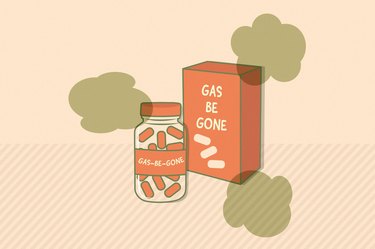Let’s find out ‘Is Taking Anti-Gas Pills Everyday Detrimental?’ If you’re experiencing excessive flatulence, using an over-the-counter anti-gas medication is a simple approach to alleviate tummy rumbles. But what if you take the medication every day?
Gas-X, Gas Aide, Mylicon, Maalox Gas, and other products are designed to relieve gassiness as well as symptoms such as bloating, burping, and pain or fullness.

They all contain simethicone, an anti-gas ingredient that disperses gas bubbles within the digestive tract to help the body pass them more readily, according to Bharat Pothuri, MD, a gastroenterologist at Memorial Hermann hospital in Houston, Texas.
According to the U.S. National Library of Medicine, simethicone doesn’t have any harmful side effects (NLM). Additionally, it is not absorbed systemically and won’t accumulate in your body over time; in other words, any drug that your body doesn’t need just passes through your system.
In summary, according to Dr. Pothuri, it’s a safe drug that won’t hurt you if you take it frequently. She does, however, caution against popping simethicone pills like candy every day.
Is Taking Anti-Gas Pills Everyday Detrimental?
The NLM advises taking 40 to 125 milligrams of simethicone four times a day as needed, after meals and at bedtime, if you’re experiencing gas. The medication does not, however, address the underlying reason for excessive gas.
In other words, it’s okay to occasionally use simethicone for gas or bloating. However, if you’re always using it to treat flatulence, it may indicate a more serious GI issue that needs to be treated.
According to Dr. Pothuri, “gas is a relatively common symptom seen in people with irritable bowel syndrome.”
You may also have difficulty digesting certain foods or enzymes, such as lactose (found in milk and dairy products) or gluten (found in wheat, rye, and barley). Some people who have excessive gas have problems with foods that contain FODMAPs, a type of difficult-to-digest sugar present in certain fruits and vegetables.
These underlying causes can be serious at times. According to Dr. Pothuri, inflammatory bowel diseases such as Crohn’s disease and ulcerative colitis, vascular disease of the gut, motility disorders of the stomach or intestines, celiac disease, pancreatic insufficiency, small intestinal bacterial overgrowth (SIBO), and even some GI cancers can all cause an increase in gas as well as other GI symptoms.
What to Do Instead of Taking Anti-Gas Pills Daily
Rather than relying on simethicone to soothe your stomach every day, consult your doctor or a gastroenterologist to determine what is causing your gas.
“There could be an underlying curable cause,” adds Dr. Pothuri.
If a complete GI exam results in a clean bill of health but you’re still gassy, Dr. Pothuri says you can take efforts to prevent gas from becoming a problem in the first place. To avoid gas, the Mayo Clinic recommends the following measures:
- Consume smaller and more frequent meals.
- Consume your food slowly and completely.
- Chewing gum, sucking on hard candies, and sipping via a straw are all bad ideas. All of these factors can lead to you swallowing more air and producing more gas.
- Reduce your consumption of fatty foods, which take longer to digest and can result in increased gas. (You can also include anti-bloating foods in your diet.)
- Reduce your intake of carbonated beverages, which cause gas bubbles in your stomach. (Instead, try these liquids to relieve gas and bloating.)
- Drink plenty of water to help with regular bowel motions, which can help minimize gas.
- Exercise on a regular basis. Moving more aids in the discharge of trapped gas in your GI tract.
So, How Bad Is It Really to Take Anti-Gas Pills Every Day?
A regular intake of simethicone is unlikely to damage you. However, requiring it on a frequent basis may indicate that you have a GI condition that isn’t being addressed, so notify your doctor. You can discover what’s causing the gas in the first place if you work together, and you won’t need the drugs to feel better.



